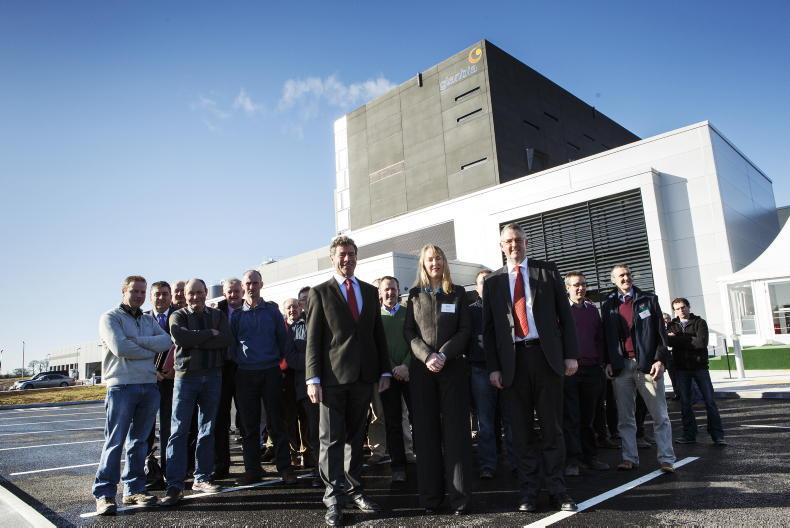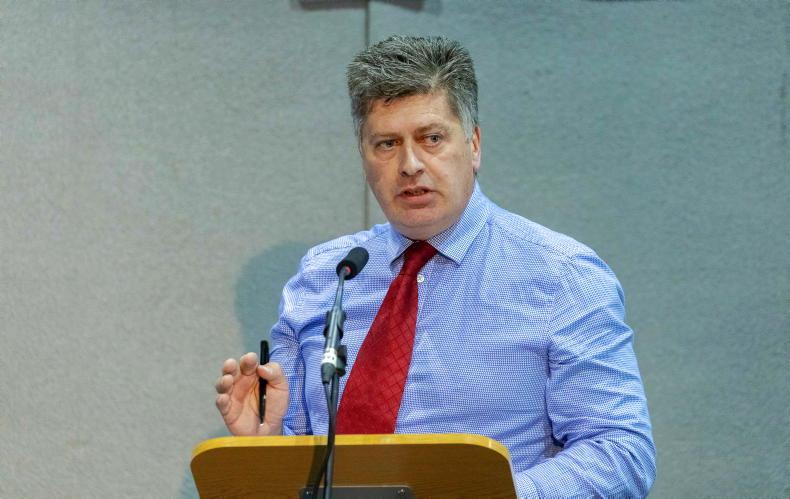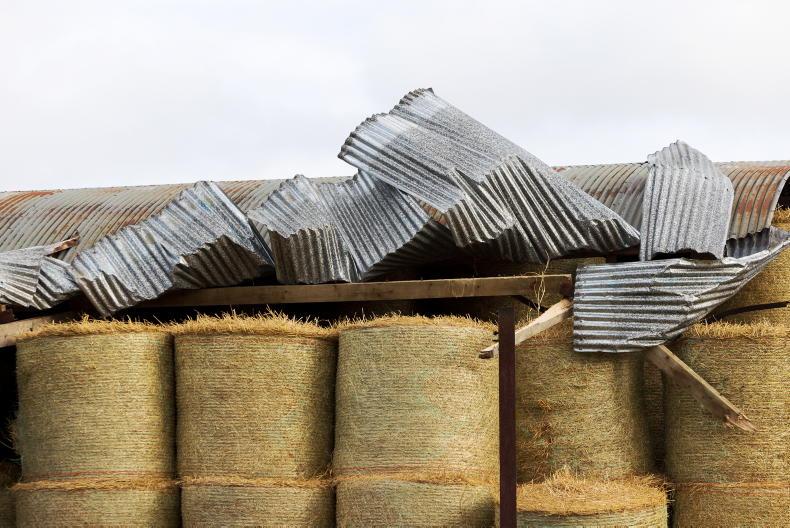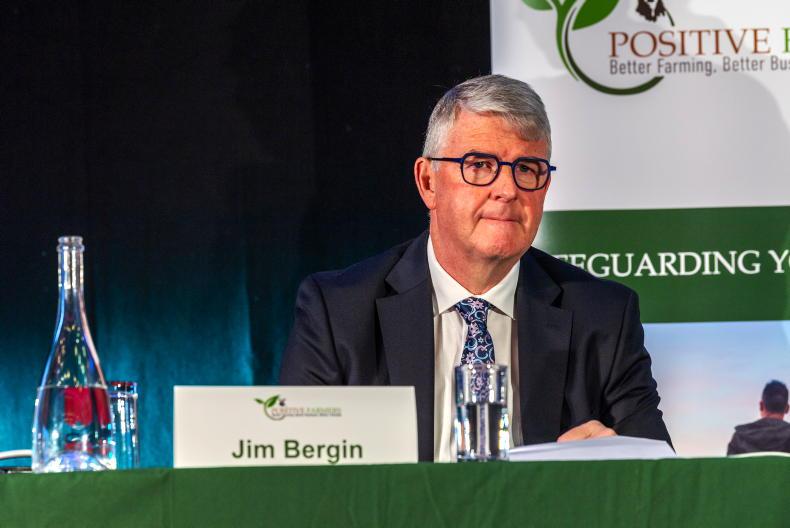In his address on YouTube to suppliers this week, Glanbia Co-op boss Jim Bergin suggested the business had performed well over the last number of years in terms of paying a competitive milk price.
Based on what we have published to date over the last three years, let’s just check this out.
We publish two milk price comparison exercises. The monthly milk league and an annual audited milk price review. They serve two different purposes.
The monthly milk league tracks monthly base price movements.
These are unaudited and based on what information we collect from processors and farmers. They don’t include conditional payments that may be available on trading or quality.
So it’s a base price comparison exercise that also calculates the size of the monthly milk cheque for a supplier delivering 500,000 litres per year in a seasonal milk supply curve at national average solids and co-op solids.
Jim Bergin said this week that Glanbia told suppliers in 2017 that it would pay a “strong competitive milk price” and now, in order to convince milk suppliers on this new deal, it is saying it will pay the “best possible milk price”.
So did Glanbia pay a strong competitive milk price since 2017? I’d argue it didn’t if we take a detailed look at the last three years – 2019, 2020 and 2021 to date.
In 2019, Glanbia Co-op supported milk price eight months out of 12 and it still dragged along the bottom of the monthly milk league (see graphic).
In 2020 the price didn’t get much better and remained well below the average processor pay out, which includes the share of Glanbia Ireland profit.
In 2021, Glanbia’s price improved to just about exceed average payout for the year to date.
So, in two out of the last three years, using this exercise, Glanbia has paid well below average, and this year to date it is just about on average.
This is in comparison with the other Irish processors only, not any international players.
KPMG/IFJ review
We can also look at the result for the 2019 KPMG/IFJ annual milk price review, standardised for milk solids and including conditional bonuses like milk quality for manufacturing milk.
This is the only audited exercise for the last three years.
The story is much the same. The price when we compare apples with apples is 29.03c/l compared to the average payout that year of 30.3c/l, so Glanbia was 1.3c/l behind the average payout.
This again is despite the fact that the co-op supported milk price significantly in 2019.
In the unstandardised ranking table, Glanbia was placed sixth behind the west Cork co-ops and Kerry, paying 33.12 c/l with Barryroe on top paying 35.29 c/l.
So the numbers suggest Glanbia didn’t pay a strong competitive milk price as suggested it might do from 2017 onwards.
We can argue on the specific metrics but the exercises only attempt to compare like with like.
The KPMG number for 2019 includes any quality incentives directly related to milk, not trading bonuses, dividends etc.
If we stripped out the co-op support for 2019 it would have been an even further disaster of a year for Glanbia milk suppliers.
In summary, my gripe is not about milk price per se – the numbers speak for themselves. For me this exercise highlights the inadequacies in the current proposal to shareholders and milk suppliers.
What happened for the last three years is the business prioritised specific measures that were clearly identified from the get-go.
What wasn’t specifically identified was milk price and it was used as the flux valve to deliver the other priorities.
The business met its 3.2% profit after tax target and it met its expansion investment target. It used the monthly, retrospective milk price flexibility to ensure it delivered on both of those commitments.
The first two commitments were specific and measured and were delivered. The third was unspecific and wasn’t delivered.
The current proposal to shareholders on milk price is unspecific, unmeasurable and risks ending up like the 2017 commitment on milk price.
Earnings per share
Again this week Bergin referenced the earnings per share guidance that the plc delivers in advance every year.
The plc will reach the high end of earning guidance this year. It’s good news, specific and measurable, and the plc will deliver.
Something similar on milk price guidance that builds in flexibility would make suppliers much more enthusiastic on the big sell-down of shareholding.
It is important to say that in general there is huge appetite among farmers to buy back the 40% of Glanbia Ireland from the plc, but this interlinked proposal goes much further than that.
The investment fund suffers from much the same problem as the milk price issue facing farmers – the unmeasured, unspecific and unknown element.
It is the one section of the package deal that continues to grate with milk suppliers and shareholders.
Most shareholders with a vote have no problem with the ambition and the idea of investing to set up another income stream or develop a synergistic relationship with existing farm businesses.
However, again there is little detail on what type of investment, when it will be delivered, who will deliver it and if it’s the right thing to do for a business that needs to deliver on primary commitments first to win over the “hearts and minds” of suppliers, as Bergin says.
Shareholders don’t know if it’s a passive investment, an active investment, or a number of different investments.
They are none the wiser as to whether it will deliver a dividend, capital growth, what risk profile is being looked at etc.
Many milk suppliers carry the scars of investments that have gone wrong on borrowed money and many are still paying the price.
What would be wrong with coming back to shareholders at a later stage for the next step in the journey?
Now shareholders are being asked to approve the move and they could be buying a pig in a poke, which many have had first-hand experience of – once bitten, twice shy.
The plc shareholding investment is delivering, is passive, and is diversified to some extent, and many farmers are saying let it sit.
The potential debt load the new business will carry is again up in the air depending on what funding option is taken – sell the plc shares or hold the shares and maybe get a convertible bond as it did in 2016.
The west Waterford farmers weren’t happy with the repayment options they heard this week.
The remaining Glanbia Ireland debt will move to the new entity and has to be serviced. Let’s assume it has gone down from €230m to €150m in 2021.
The €286m will have to be borrowed if they don’t sell plc shares, albeit they have permission to sell shares if successful.
The €28m legally tied to Glanbia Ireland has to be paid, so the estimate is the total debt for the new entity will be about €460m. The co-op is debt-free and I’m sure there are cash reserves.
It’s not an extreme debt level for a well-run dairy business worth over €700m with a plc shareholding worth over €1bn, but again the uncertainty is leaving some shareholders edgy.
We know the board of directors, Bergin and his management team can deliver – they did on the PAT, and the expansion investment. They are leaders on innovation in other aspects.
They can lead on milk price and on the investment fund if they show more metrics and specifics.
They have scale, a well-invested business, a route to market and yet they don’t want to lead on this aspect that is crucial to the returns of their suppliers.
They should back themselves to pay a milk price as they have a great line of sight now, given the investment that has taken place in the business.
Something like this is not new, FrieslandCampina in the Netherlands and Fonterra in New Zealand do it.
Glanbia has led in Ireland on other initiatives like forward pricing etc; it should do so again.
It can back into the Ornua index or a combination of other processors. It won’t mean Glanbia won’t deliver on other financial commitments as Bergin suggests.
In principle I agree with most of the deal – the buyout, the spin-out which is part and parcel of any deal with a wider shareholder base.
Even the governance changes make sense rather than an annual election contest for Chair.
However, suppliers and shareholders have made a strong case for sticking and delivering on new commitments with a new ownership model first and then looking to evolve even further in a number of years if the business continues to deliver.
The mix of funding options, the recent share price fall, the debt payback plan, and an unspecified investment strategy haven’t helped this particular deal.
The Glanbia business delivered the 1.5c/l margin it required when it was Glanbia Ingredients Ireland. It then evolved to the 3.2% profit after tax and it delivered that also post-2017.
Milk suppliers suffered relative to other farmgate prices to allow delivery of this.
For me, milk suppliers should get some guaranteed range in milk price as part of this package, either similar to what Fonterra do at the start of the year or similar to what FrieslandCampina do and pay a set amount and then top-up with a 13th payment.
Investment fund
On the investment fund again there are no specifics detailed. I feel farmers and shareholders deserve better.
So in principle no objection to full co-op ownership, no objection to the spin-out or to investment fund, but, put in place some measures to help give confidence and delivery and as per the last number of years, and no need to package altogether.
When the measures are there, this management team have shown they can deliver. The ambition is real, but shareholders and farmers deserve more than words.
Specifics and business plans are much stronger.
Changes needed or the target threshold vote won’t be achieved.
It’s such a pity, it’s close, but no turkey when the proposal is packaged this way.
Delivery is the best measure of success and when Glanbia is specific and measured, it usually delivers. The greater Glanbia business has delivered on profit targets and expansion capacity, but not milk price because it wasn’t specified or targeted. The unknowns and unspecifics in the current proposal are holding back the overall package.
In his address on YouTube to suppliers this week, Glanbia Co-op boss Jim Bergin suggested the business had performed well over the last number of years in terms of paying a competitive milk price.
Based on what we have published to date over the last three years, let’s just check this out.
We publish two milk price comparison exercises. The monthly milk league and an annual audited milk price review. They serve two different purposes.
The monthly milk league tracks monthly base price movements.
These are unaudited and based on what information we collect from processors and farmers. They don’t include conditional payments that may be available on trading or quality.
So it’s a base price comparison exercise that also calculates the size of the monthly milk cheque for a supplier delivering 500,000 litres per year in a seasonal milk supply curve at national average solids and co-op solids.
Jim Bergin said this week that Glanbia told suppliers in 2017 that it would pay a “strong competitive milk price” and now, in order to convince milk suppliers on this new deal, it is saying it will pay the “best possible milk price”.
So did Glanbia pay a strong competitive milk price since 2017? I’d argue it didn’t if we take a detailed look at the last three years – 2019, 2020 and 2021 to date.
In 2019, Glanbia Co-op supported milk price eight months out of 12 and it still dragged along the bottom of the monthly milk league (see graphic).
In 2020 the price didn’t get much better and remained well below the average processor pay out, which includes the share of Glanbia Ireland profit.
In 2021, Glanbia’s price improved to just about exceed average payout for the year to date.
So, in two out of the last three years, using this exercise, Glanbia has paid well below average, and this year to date it is just about on average.
This is in comparison with the other Irish processors only, not any international players.
KPMG/IFJ review
We can also look at the result for the 2019 KPMG/IFJ annual milk price review, standardised for milk solids and including conditional bonuses like milk quality for manufacturing milk.
This is the only audited exercise for the last three years.
The story is much the same. The price when we compare apples with apples is 29.03c/l compared to the average payout that year of 30.3c/l, so Glanbia was 1.3c/l behind the average payout.
This again is despite the fact that the co-op supported milk price significantly in 2019.
In the unstandardised ranking table, Glanbia was placed sixth behind the west Cork co-ops and Kerry, paying 33.12 c/l with Barryroe on top paying 35.29 c/l.
So the numbers suggest Glanbia didn’t pay a strong competitive milk price as suggested it might do from 2017 onwards.
We can argue on the specific metrics but the exercises only attempt to compare like with like.
The KPMG number for 2019 includes any quality incentives directly related to milk, not trading bonuses, dividends etc.
If we stripped out the co-op support for 2019 it would have been an even further disaster of a year for Glanbia milk suppliers.
In summary, my gripe is not about milk price per se – the numbers speak for themselves. For me this exercise highlights the inadequacies in the current proposal to shareholders and milk suppliers.
What happened for the last three years is the business prioritised specific measures that were clearly identified from the get-go.
What wasn’t specifically identified was milk price and it was used as the flux valve to deliver the other priorities.
The business met its 3.2% profit after tax target and it met its expansion investment target. It used the monthly, retrospective milk price flexibility to ensure it delivered on both of those commitments.
The first two commitments were specific and measured and were delivered. The third was unspecific and wasn’t delivered.
The current proposal to shareholders on milk price is unspecific, unmeasurable and risks ending up like the 2017 commitment on milk price.
Earnings per share
Again this week Bergin referenced the earnings per share guidance that the plc delivers in advance every year.
The plc will reach the high end of earning guidance this year. It’s good news, specific and measurable, and the plc will deliver.
Something similar on milk price guidance that builds in flexibility would make suppliers much more enthusiastic on the big sell-down of shareholding.
It is important to say that in general there is huge appetite among farmers to buy back the 40% of Glanbia Ireland from the plc, but this interlinked proposal goes much further than that.
The investment fund suffers from much the same problem as the milk price issue facing farmers – the unmeasured, unspecific and unknown element.
It is the one section of the package deal that continues to grate with milk suppliers and shareholders.
Most shareholders with a vote have no problem with the ambition and the idea of investing to set up another income stream or develop a synergistic relationship with existing farm businesses.
However, again there is little detail on what type of investment, when it will be delivered, who will deliver it and if it’s the right thing to do for a business that needs to deliver on primary commitments first to win over the “hearts and minds” of suppliers, as Bergin says.
Shareholders don’t know if it’s a passive investment, an active investment, or a number of different investments.
They are none the wiser as to whether it will deliver a dividend, capital growth, what risk profile is being looked at etc.
Many milk suppliers carry the scars of investments that have gone wrong on borrowed money and many are still paying the price.
What would be wrong with coming back to shareholders at a later stage for the next step in the journey?
Now shareholders are being asked to approve the move and they could be buying a pig in a poke, which many have had first-hand experience of – once bitten, twice shy.
The plc shareholding investment is delivering, is passive, and is diversified to some extent, and many farmers are saying let it sit.
The potential debt load the new business will carry is again up in the air depending on what funding option is taken – sell the plc shares or hold the shares and maybe get a convertible bond as it did in 2016.
The west Waterford farmers weren’t happy with the repayment options they heard this week.
The remaining Glanbia Ireland debt will move to the new entity and has to be serviced. Let’s assume it has gone down from €230m to €150m in 2021.
The €286m will have to be borrowed if they don’t sell plc shares, albeit they have permission to sell shares if successful.
The €28m legally tied to Glanbia Ireland has to be paid, so the estimate is the total debt for the new entity will be about €460m. The co-op is debt-free and I’m sure there are cash reserves.
It’s not an extreme debt level for a well-run dairy business worth over €700m with a plc shareholding worth over €1bn, but again the uncertainty is leaving some shareholders edgy.
We know the board of directors, Bergin and his management team can deliver – they did on the PAT, and the expansion investment. They are leaders on innovation in other aspects.
They can lead on milk price and on the investment fund if they show more metrics and specifics.
They have scale, a well-invested business, a route to market and yet they don’t want to lead on this aspect that is crucial to the returns of their suppliers.
They should back themselves to pay a milk price as they have a great line of sight now, given the investment that has taken place in the business.
Something like this is not new, FrieslandCampina in the Netherlands and Fonterra in New Zealand do it.
Glanbia has led in Ireland on other initiatives like forward pricing etc; it should do so again.
It can back into the Ornua index or a combination of other processors. It won’t mean Glanbia won’t deliver on other financial commitments as Bergin suggests.
In principle I agree with most of the deal – the buyout, the spin-out which is part and parcel of any deal with a wider shareholder base.
Even the governance changes make sense rather than an annual election contest for Chair.
However, suppliers and shareholders have made a strong case for sticking and delivering on new commitments with a new ownership model first and then looking to evolve even further in a number of years if the business continues to deliver.
The mix of funding options, the recent share price fall, the debt payback plan, and an unspecified investment strategy haven’t helped this particular deal.
The Glanbia business delivered the 1.5c/l margin it required when it was Glanbia Ingredients Ireland. It then evolved to the 3.2% profit after tax and it delivered that also post-2017.
Milk suppliers suffered relative to other farmgate prices to allow delivery of this.
For me, milk suppliers should get some guaranteed range in milk price as part of this package, either similar to what Fonterra do at the start of the year or similar to what FrieslandCampina do and pay a set amount and then top-up with a 13th payment.
Investment fund
On the investment fund again there are no specifics detailed. I feel farmers and shareholders deserve better.
So in principle no objection to full co-op ownership, no objection to the spin-out or to investment fund, but, put in place some measures to help give confidence and delivery and as per the last number of years, and no need to package altogether.
When the measures are there, this management team have shown they can deliver. The ambition is real, but shareholders and farmers deserve more than words.
Specifics and business plans are much stronger.
Changes needed or the target threshold vote won’t be achieved.
It’s such a pity, it’s close, but no turkey when the proposal is packaged this way.
Delivery is the best measure of success and when Glanbia is specific and measured, it usually delivers. The greater Glanbia business has delivered on profit targets and expansion capacity, but not milk price because it wasn’t specified or targeted. The unknowns and unspecifics in the current proposal are holding back the overall package. 









SHARING OPTIONS